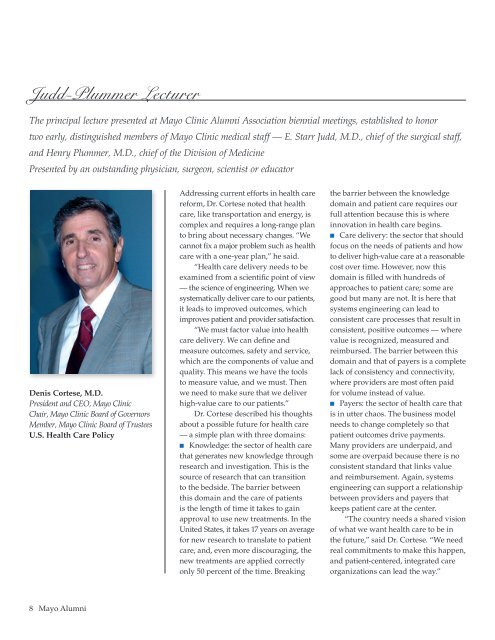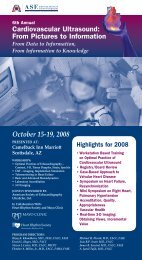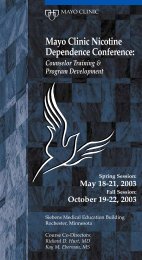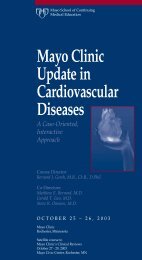Humanitarian Award - Mayo Clinic
Humanitarian Award - Mayo Clinic
Humanitarian Award - Mayo Clinic
Create successful ePaper yourself
Turn your PDF publications into a flip-book with our unique Google optimized e-Paper software.
Judd-Plummer Lecturer<br />
The principal lecture presented at <strong>Mayo</strong> <strong>Clinic</strong> Alumni Association biennial meetings, established to honor<br />
two early, distinguished members of <strong>Mayo</strong> <strong>Clinic</strong> medical staff — E. Starr Judd, M.D., chief of the surgical staff,<br />
and Henry Plummer, M.D., chief of the Division of Medicine<br />
Presented by an outstanding physician, surgeon, scientist or educator<br />
Denis Cortese, M.D.<br />
President and CEO, <strong>Mayo</strong> <strong>Clinic</strong><br />
Chair, <strong>Mayo</strong> <strong>Clinic</strong> Board of Governors<br />
Member, <strong>Mayo</strong> <strong>Clinic</strong> Board of Trustees<br />
U.S. Health Care Policy<br />
8 <strong>Mayo</strong> Alumni<br />
Addressing current efforts in health care<br />
reform, Dr. Cortese noted that health<br />
care, like transportation and energy, is<br />
complex and requires a long-range plan<br />
to bring about necessary changes. “We<br />
cannot fix a major problem such as health<br />
care with a one-year plan,” he said.<br />
“Health care delivery needs to be<br />
examined from a scientific point of view<br />
— the science of engineering. When we<br />
systematically deliver care to our patients,<br />
it leads to improved outcomes, which<br />
improves patient and provider satisfaction.<br />
“We must factor value into health<br />
care delivery. We can define and<br />
measure outcomes, safety and service,<br />
which are the components of value and<br />
quality. This means we have the tools<br />
to measure value, and we must. Then<br />
we need to make sure that we deliver<br />
high-value care to our patients.”<br />
Dr. Cortese described his thoughts<br />
about a possible future for health care<br />
— a simple plan with three domains:<br />
n Knowledge: the sector of health care<br />
that generates new knowledge through<br />
research and investigation. This is the<br />
source of research that can transition<br />
to the bedside. The barrier between<br />
this domain and the care of patients<br />
is the length of time it takes to gain<br />
approval to use new treatments. In the<br />
United States, it takes 17 years on average<br />
for new research to translate to patient<br />
care, and, even more discouraging, the<br />
new treatments are applied correctly<br />
only 50 percent of the time. Breaking<br />
the barrier between the knowledge<br />
domain and patient care requires our<br />
full attention because this is where<br />
innovation in health care begins.<br />
n Care delivery: the sector that should<br />
focus on the needs of patients and how<br />
to deliver high-value care at a reasonable<br />
cost over time. However, now this<br />
domain is filled with hundreds of<br />
approaches to patient care; some are<br />
good but many are not. It is here that<br />
systems engineering can lead to<br />
consistent care processes that result in<br />
consistent, positive outcomes — where<br />
value is recognized, measured and<br />
reimbursed. The barrier between this<br />
domain and that of payers is a complete<br />
lack of consistency and connectivity,<br />
where providers are most often paid<br />
for volume instead of value.<br />
n Payers: the sector of health care that<br />
is in utter chaos. The business model<br />
needs to change completely so that<br />
patient outcomes drive payments.<br />
Many providers are underpaid, and<br />
some are overpaid because there is no<br />
consistent standard that links value<br />
and reimbursement. Again, systems<br />
engineering can support a relationship<br />
between providers and payers that<br />
keeps patient care at the center.<br />
“The country needs a shared vision<br />
of what we want health care to be in<br />
the future,” said Dr. Cortese. “We need<br />
real commitments to make this happen,<br />
and patient-centered, integrated care<br />
organizations can lead the way.”

















